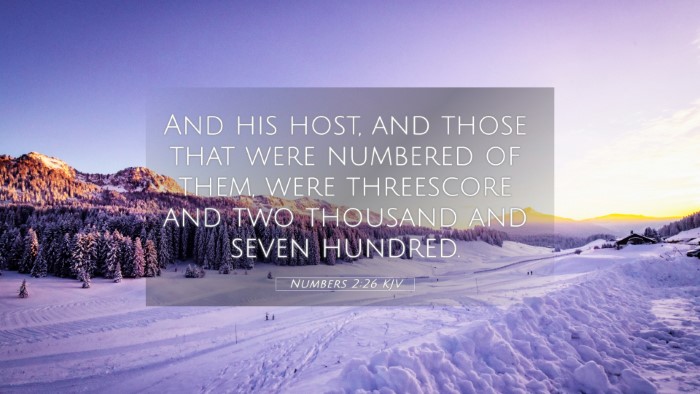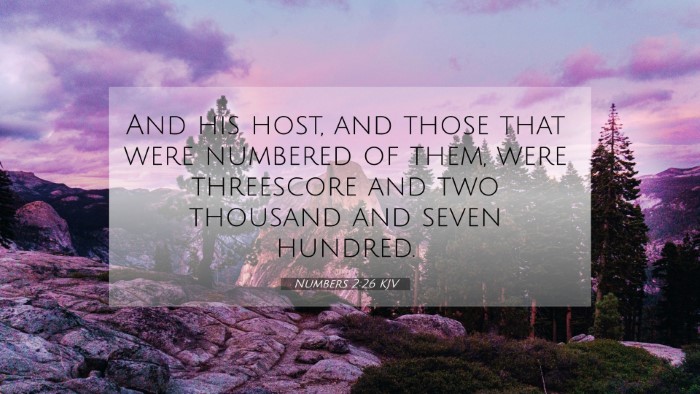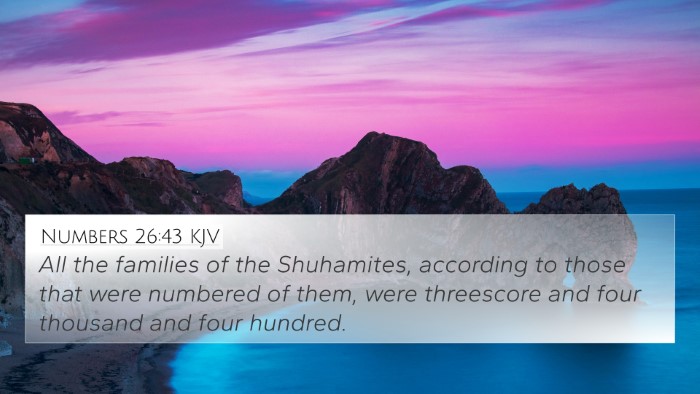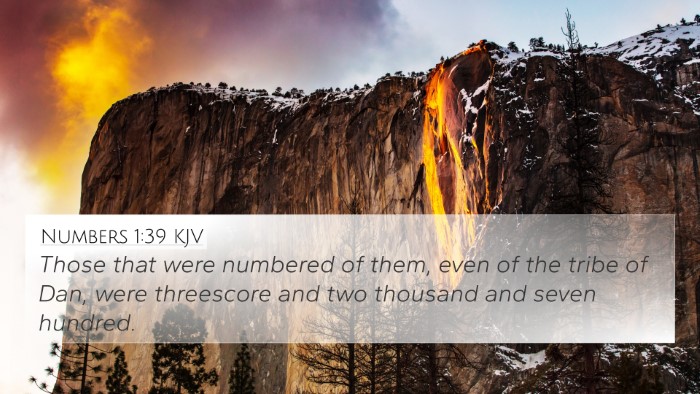Understanding Numbers 2:26
Numbers 2:26: "And those who camp next to him shall be the tribe of Gad; and the captain of the children of Gad shall be Eliasaph the son of Reuel."
This verse depicts the organization of the Israelite encampment during their journey in the wilderness, highlighting the tribe of Gad's significant role and its leadership.
Summary of Insights
According to public domain commentaries, this verse reflects the following key insights:
- Tribal Organization: The placement of the tribes demonstrates God's order and structure within the community of Israel during their exodus from Egypt. The camp is strategically organized, signifying the importance of each tribe's role.
- Leadership: Eliasaph, as the captain of the tribe of Gad, represents not only authority but also the responsibilities of guiding his people. His leadership is crucial in maintaining unity and focus among the Israelites.
- Divine Order: The specific mention of tribes and their captains illustrates God's providence and meticulous planning in every aspect of the Israelites' journey and settlement.
Detailed Analysis
1. The Role of Gad: Gad, one of Jacob's sons, signifies strength and warrior spirit, as portrayed in the blessing given to him by his father (Genesis 49:19). His placement in the camp reflects the significance of strength in the community's defense and progression.
2. God’s Command: The structure of the camp and its leadership were established through God's command, reinforcing the importance of obedience and divine order in the lives of the Israelites.
3. Symbolism of Camp Layout: Each tribe's placement, including Gad's, symbolizes their role in the broader narrative of Israel's journey—emphasizing community, collaboration, and shared purpose.
Bible Verse Cross-References
This verse connects with various other biblical texts, which provide a richer understanding of its meaning:
- Genesis 49:19: This verse affirms the characteristics attributed to the tribe of Gad, speaking of his valor and struggle.
- Numbers 1:14: A prior count of the tribes and their leaders establishes the leadership roles further explored in Numbers 2.
- Exodus 12:21-23: Highlights God's directions to the Israelites that initiated their journey—drawing connections to obedience and protection.
- Deuteronomy 33:20-21: Moses’ blessing of the tribes further elucidates the importance and identity of Gad within Israel.
- Joshua 22:1-4: Echoing the legacy of Gad as the tribes transition into the promised land.
- Numbers 10:14-22: Discusses the order of march among the tribes, showcasing their cohesion as they travel.
- Isaiah 65:11: The future hope of Israel includes references to tribes, revealing their enduring significance even beyond their wilderness journey.
Thematic Bible Verse Connections
When studying Numbers 2:26, it's fruitful to explore thematic connections:
- Leadership and Community: Examining how God appoints leaders to guide His people in various contexts both in history and personal faith journeys.
- Obedience to Divine Order: Analyzing how obedience leads to divine provision and direction in our lives, similar to the Israelites' journey.
- Identity Among Tribes: Understanding how each believer has a unique role in the body of Christ reflective of the tribes' distinct identities in Israel.
Conclusion
In summary, Numbers 2:26 beautifully reflects the organization, strength, and leadership within the community of Israel, emphasizing the significance of obedience and divine planning. This passage not only offers insights into the historical context but also into spiritual principles regarding leadership, community, and following God’s guidance.
By cross-referencing these themes and the verses listed above, we can deepen our understanding of how each part of Scripture interconnects, enriching our overall comprehension of God’s narrative and our roles within it.




